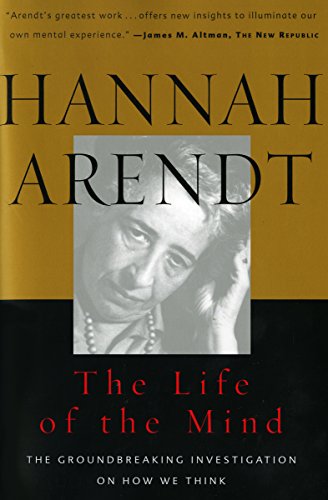
The Life of the Mind

remembrance, by which you make present to your mind what actually is absent and past, reveals the meaning in the form of a story.
Hannah Arendt • The Life of the Mind
Without spectators the world would be imperfect; the participant, absorbed as he is in particular things and pressed by urgent business, cannot see how all the particular things in the world and every particular deed in the realm of human affairs fit together and produce a harmony, which itself is not given to sense perception, and this invisible
... See moreHannah Arendt • The Life of the Mind
There exists a report of a lost poem by Pindar. It described a marriage feast of Zeus, where Zeus asked the assembled gods whether their happy blessedness still lacked something. Whereupon the gods begged him to create some new divine beings who would know how to beautify all his great works “with words and music.” The new godlike beings Pindar had
... See moreHannah Arendt • The Life of the Mind
Thus Kant still says: “worauf alles Denken als Mittel abzweckt, [ist] die Anschauung,” “all thinking is a means of reaching intuition.”
Hannah Arendt • The Life of the Mind
Hence, Aristotle, though he, too, in a different context, spoke of a truth aneu logou, a truth that refused to be expressed in discourse,94 would not have said with Plato: Of the subjects that concern me nothing is known, since there exists nothing in writing about them, nor will there ever exist anything in the future. People who write about such
... See moreHannah Arendt • The Life of the Mind
Analogies, metaphors, and emblems are the threads by which the mind holds on to the world even when, absent-mindedly, it has lost direct contact with it, and they guarantee the unity of human experience.
Hannah Arendt • The Life of the Mind
scent of each of them.”81 Philosophy, one is inclined to agree, did go to Homer’s school in order to emulate his example. And one’s tendency to agree is considerably strengthened by the two earliest, most famous influential of all thought parables: Parmenides’ voyage to the gates of day and night and Plato’s Cave parable, the former being a poem
... See moreHannah Arendt • The Life of the Mind
Thus we read in a little-known essay by Ernest Fenollosa, published by Ezra Pound and so far as I know never mentioned in the literature on the metaphor: “Metaphor is . . . the very substance of poetry”; without it, “there would have been no bridge whereby to cross from the minor truth of the seen to the major truth of the unseen.”
Hannah Arendt • The Life of the Mind
The metaphor, bridging the abyss between inward and invisible mental activities and the world of appearances, was certainly the greatest gift language could bestow on thinking and hence on philosophy, but the metaphor itself is poetic rather than philosophical in origin.